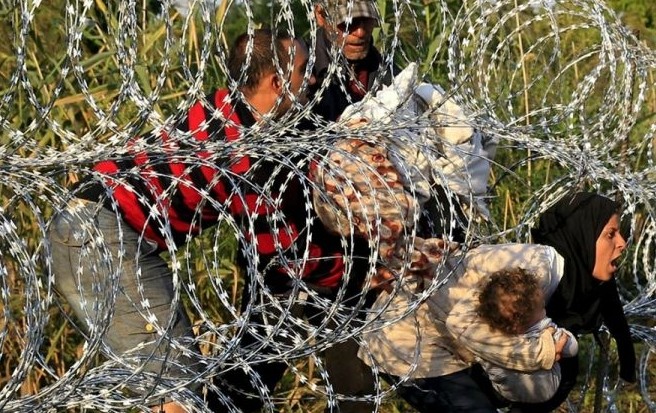By William Foley
The sinking of five boats in the Mediterranean this April with an estimated death toll of 1200 brought to light the shocking and inhuman treatment of migrants seeking to enter Europe. The intensification of conflict in Middle Eastern regions such as Syria has been one factor in the increased number of people seeking refuge from death and destruction. According to Eurostat, the number of asylum seekers applying for protection in the EU increased by 84% in the first quarter of 2015 compared to the same period in 2014.
Barriers and restrictions
The conflicts which many of these people are fleeing have, by and large, been created and fuelled by the imperialist interests of Western powers. Last year, more than 85% who first arrived in Greece came from Syria, Afghanistan, Iraq and Somalia. Yet the ruling classes of the dominant European countries who have reaped the rewards of imperialism are also responsible for Fortress Europe, the collection of barriers and restrictions on entering the EU. Treaties such as the Schengen agreement have created a single external border and established new barriers to entry for migrants and refugees.
In October 2013 the Italian government set up the Mare Nostrum sea rescue programme in response to the huge public outcry around the drowning of 300 migrants near the island of Lampedusa. Over the course of a year, the operation rescued an estimated 130,000 people, and offered refugees medicine, shelter, food, and legal advice. The programme was wound down due to criticism of senior European politicians that the programme was creating a “pull factor”. The governments of other countries refused to help for this reason.
Defend the right to asylum
Mare Nostrum was replaced with Operation Triton, which is run by the EU’s Frontex border agency. The operation has less than a third of Mare Nostrum’s budget and has focused mainly on border protection. The result: over one thousand more migrants died in April of this year compared to last year. Those that do make it have been confined in inhumane conditions in camps across Europe from Greece to Calais where many refugees have died trying to swim across the channel.
It is clear that this “migrant crisis” is yet another symptom of the brutality and inhumanity of the capitalist system. According to the priorities of this system there is no limit to the amount of money that can be found to bail out big banks and bondholders. The lives of migrants however are worth only the equivalent of back-of-the-sofa change.
We must rid Europe of this system that breeds racist division and treats the most oppressed and marginalised with despicable contempt. We must fight a socialist Europe of solidarity, human compassion and where the needs of all those who live or who live here are met.












